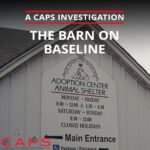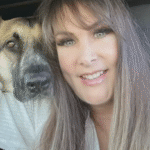
Update: SB 876/HB 2238 passed the Texas Legislature in May with bipartisan support and were signed by the governor on May 29, 2023.
CAPS’ breeder investigations are primarily in the Midwest, the most common location for puppy and kitten mills that supply pet stores across the U.S. Texas, however, is a state rife with mills, both licensed and unlicensed. As part of our partnership with Texas Humane Legislation Network, CAPS has been investigating unlicensed Texas breeders. THLN is using our evidence for SB 876/HB 2238, which would improve the Texas Licensed Breeders Program by decreasing the number of dogs or cats required to have a state license from 130 total dogs/puppies and cats/kittens to 10 breeding females. The bills would also remove the sales requirement. Currently, breeders who report sales of 20 puppies or kittens per year are covered under state law, which means cash sales are not disclosed.
The exact number of mills is impossible to discover, in part because the state is made of secluded, large rural properties capable of hiding massive mills on them that are impossible for anyone else to see or hear. Also, it’s because of Texas’ lax regulations.. In the spirit of reducing government interference, Texas breeders only need a state license if they have eleven or more breeding females. However, proposed state legislation would require them to have a license if they have four or more breeding females, just like the USDA requires breeders who sell online or to pet stores. While the Texas Licensing Department has only so many employees, licensing more facilities will bring in more revenue to them, enable them to bust the worst offenders, and force many facilities to improve conditions. CAPS discovered the need for this legislation as I documented puppy mills across Texas. At several facilities, I found abhorrent conditions but for too few dogs for the breeders to require licenses. At others, I found too many dogs for breeders to not have licenses or clear violations at licensed facilities.
At Little Beagles in Bertram, TX, and Kerrie Engelmann’s mill in Manor, TX, I found dogs living amongst piles of their own feces in derelict runs. Little Beagles is run by Jennifer Eaton, who converted the dirt runs of an old chicken coup into a puppy mill. Beagles ran through piles of manure that appeared to have been built up over several weeks. Dog pens had walls made of rusty, broken chicken wire that poked dogs as they ran by it. A small wooden building in one pen acted as a whelping barn, but it had numerous gaps and holes in its walls. Jennifer showed me puppies from the building by bringing them out in a metal dog feed bucket with dirty stains inside of it.
At Engelmann’s facility, I saw French Bulldogs and Chihuahuas with virtually no place to stand in their outdoor pens without being in their own feces. Tarps over the pens had fallen into some of them. Besides two of Eaton’s dogs having cherry eye, dogs had no obvious signs of injury or illness. This, combined with the fact that many rural animal control and sheriff’s departments in Texas (and elsewhere) are inundated with livestock neglect cases, there is little hope law enforcement can do much for the dogs at these mills or similar kennels across the U.S. Since I didn’t see more than eleven breeding females at the facilities, there’s nothing the state can do, either.
This particular problem – that Texas only licenses facilities with eleven or more breeding females – prohibits enforcement on most puppy mills. I went to many other mills in which I saw dogs living in cages or pens, with obvious violations, but either there were too few dogs for the state to do anything with the evidence or I couldn’t clearly make out how many dogs there were. At others, breeders would claim some of the dogs weren’t theirs or weren’t being bred, masking how many dogs they were truly breeding.
Shannon Johnson has a facility in Sulphur Springs, TX, where she keeps about eight French Bulldogs in cages in her backyard (too few to require a state license). The cages were raised on the ground on metal stilt and had wire walls, wooden floorings, and plastic doghouses covered in brown stains. In contrast, chicken coups nearby had doghouses in them with bright white walls. Since no dirt was in the raised cages, it’s most likely the stains were from dog feces. The wooden framing of one cage’s flooring had green mold growing on it. Johnson’s website, however, shows dogs in grassy yards.
DV Howlies is an unlicensed puppy mill I visited in Paige, TX. Dogs were in outdoor dirt pens and indoor/outdoor runs. Large-breed dogs such as German Shepherds, Dobermans, Golden Retrievers, and others were living in various enclosures. One pen held several puppies, who were on the ground near a building wall. A plastic food dish was nearby, shoved into a hole under the wall, presumably used to keep the puppies from crawling into it. Other pens had doghouses with no windbreaks on them, and one had a plastic tub used as a water dish, the edges of it chewed and torn. Inside, I could see dingy brown water. Plastic buckets, a sink, and a wheelbarrow overflowing with metal poles and cardboard were near dog enclosures. Despite having over twenty dogs, the owner told me some of the dogs belonged to a friend, and some were being boarded. He said he was AKC-licensed but said the AKC doesn’t do inspections for breeders until they have about ten litters a year, and that the AKC called him in advance for his first inspection. Calling in advance of inspections is something I’ve seen the USDA do while working undercover at puppy mills and brokerage facilities. I witnessed these facilities cover up their violations and get clean inspection reports. Because the owner hides the actual amount of dogs he is breeding on his property, he appears to have too few dogs for a state license.
However, if Texas were to require breeders to have a license for possessing at least five breeding female dogs or cats, the state could take enforcement action against more of the worst offenders. While we all know that USDA-licensed mills are still just mills, it’s easy to forget that the worst of them can be shut down when there’s a regulatory body held to account. While I have no expectation that the Texas Licensing Department will enforce regulations all of the time, I would expect facilities that keep dogs living in their own feces to be cleaned up or shut down.
CAPS will continue to support efforts on Texas mill regulation. We’ll need CAPS supporters to be heard loud and clear about how they want the Lone Star State to do better by our companion animals.




